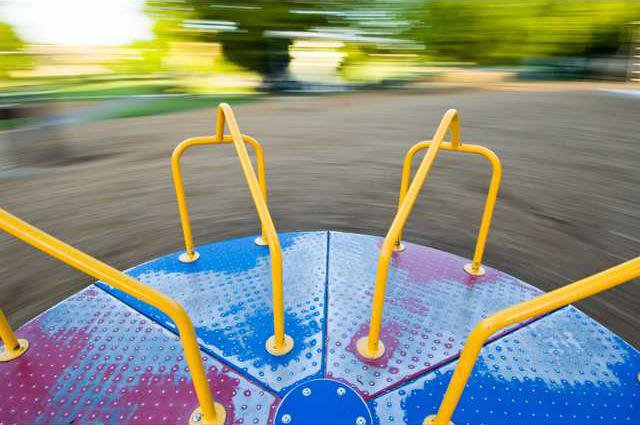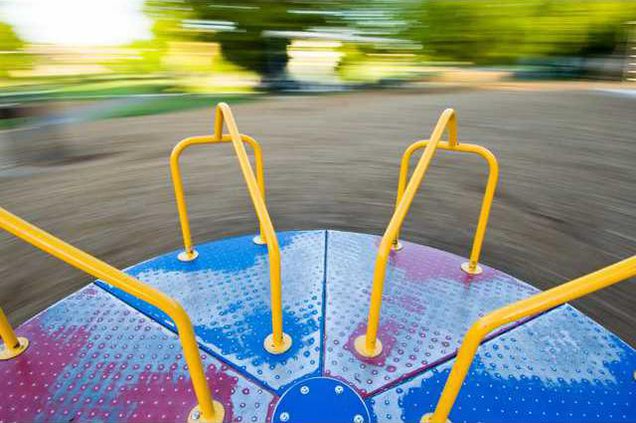This summer we returned to my mom’s hometown in the Northwest. One afternoon we stopped by good old Crown Park, a place my mom took me to play when I was a child.
I was delighted to see that the playground from my childhood is still intact. It features the metal twisty slide that will scald your bare legs in the hot sun and the swings with chains so long you think you’re going to touch the moon if you just pump high enough. It has a seesaw and a merry-go-round — two playground relics so fun and dangerous you almost never see them anymore.
My kids were in heaven. Here was a playground they could get excited about, unlike the anemic plastic ones we’ve put at every park in the U.S. that feature the same short-chained swings and slides that go so slow you have to scoot to make it to the bottom.
There was a time when parents trusted the resilience of childhood. They understood that kids should wander, experiment, take risks and get hurt. There was a sense that flying off the merry-go-round a few times might do a kid some good.
Those times are have long since passed. Parents today are bombarded with warning labels and release forms. Every week we hear a new study about the latest childhood danger from concussions to carbohydrates.
I was reminded of the generational contrast as I’ve been reading “Ramona the Pest,” that classic Beverly Clearly standby, to my brand-new kindergartener. I am struck by how different parenting was 50 years ago. Sure, the books is fiction, but it parallels the hands-off nature that went along with childhood in the '60s, '70s and '80s.
For instance, Ramona is allowed to feel a great deal of frustration. Gobs of it, in fact. There is very much the sense that she lives in the childhood world, her mother lives in the adult world, and the two do not mix much. Her parents are there when she needs them, but they do not coddle.
Ramona isn’t asked what she wants for lunch. Her mom makes tuna fish. (And she eats it because there is no promise of goldfish crackers an hour later.) She doesn’t get a two-wheel bicycle when she goes to school. Instead, her neighbor Howie (also 5 years old) removes one of her wheels and turns her tricycle into a two-wheeler.
There is ingenuity. There is independence. There is a restlessness that comes with trying to navigate a complex world by one’s self.
I look at these things as lacking from kids today, from my own kids as well. We give them so much — so much of our time, so much of our space, and so many things to play with that we leave little allowance for that triumvirate of childhood experience.
We’ve come so far that there is now a counter-culture to this type of parenting. There are people like Gever Tulley, who founded the Tinkering School as a space for kids to play with power tools and wield pocket knives. In places like Wales they are building “adventure playgrounds,” essentially controlled junkyards where kids can slide through mud, build precarious structures and light fires, all with the hope of recreating a childhood that includes freedom and a sense of danger.
To the goodly parents of today, these types of environments seem completely nuts, even if we as children freely roamed the streets and biked to the candy store across town.
For one, parents today operate under the assumption that society is more dangerous than when we were kids, when in fact the opposite is true. Crime rates in the United States are at an all-time low. In fact, with the pervasiveness of online pornography, our kids are probably safer walking to the park or kayaking on the lake by themselves than they are playing the devices we carry in our back pocket.
The second assumption parents make is that all these precautions are going to keep our kids from getting hurt. However, in a May 2014 Atlantic article by Hannah Rosin titled “The Overprotected Kid,” she states that playground-related injuries are about the same as they were in 1980, as are playground-related deaths.
Removing the seesaws and merry-go-rounds has not helped to safeguard our kids. Instead, by keeping kids fenced and supervised, we are raising a generation of fear-averse children who may not be fully ready for adulthood.
In the Atlantic article, Rosin makes particular mention of a child’s need to wander and explore without supervision. Rosin quotes researcher Ellen Sandseter, a early childhood researcher who found that of all risky play, striking out on one’s own is “the most important for the children. When (children) are left alone and can take full responsibility for their actions, and the consequences of their decisions, it’s a thrilling experience.”
I read and reread that section, thinking of my own children. I consider myself more hands-off than a lot of modern-day parents. I let my boys cook on our gas stove and use the drill. They all own pocket knives, but they have never, not once, ventured out onto the woods and trails by our home without us, not because it was against the rules, but because it hadn’t even occurred to them. The kids in our cul-de-sac stay in our cul-de-sac, even with a park, tennis courts, woods and lakes only minutes away by bike.
After reading Rosin’s article, I was determined to make a change. I shut the magazine and gave my older boys, who are 12, 10 and 9, a directive to go explore and not come back for two hours.
“Get dirty. Get wet. Get lost and find your way back,” I told them.
They looked at me as if told them to light the garage on fire.
“All by ourselves?” they asked.
“Yes,” I said. “Now go.”
They did go, and they were gone a long time. I know because I checked my watch. I second-guessed myself. I thought about going to “check” on them. Instead I sat on my hands and waited, trusting that my children would be just fine.
They came back hours later, the smell of woods in their hair and dirt caked all over their shoes.
“Mom,” they called. “We discovered a fort. We’ve created a secret land, and only kids are allowed to go there.”
Inwardly, I smiled.
Tiffany Gee Lewis lives in St. Paul, Minnesota, and is the mother of four boys. She blogs at thetiffanywindow.wordpress.com. Her email is tiffanyelewis@gmail.com.
When kids were unbreakable





